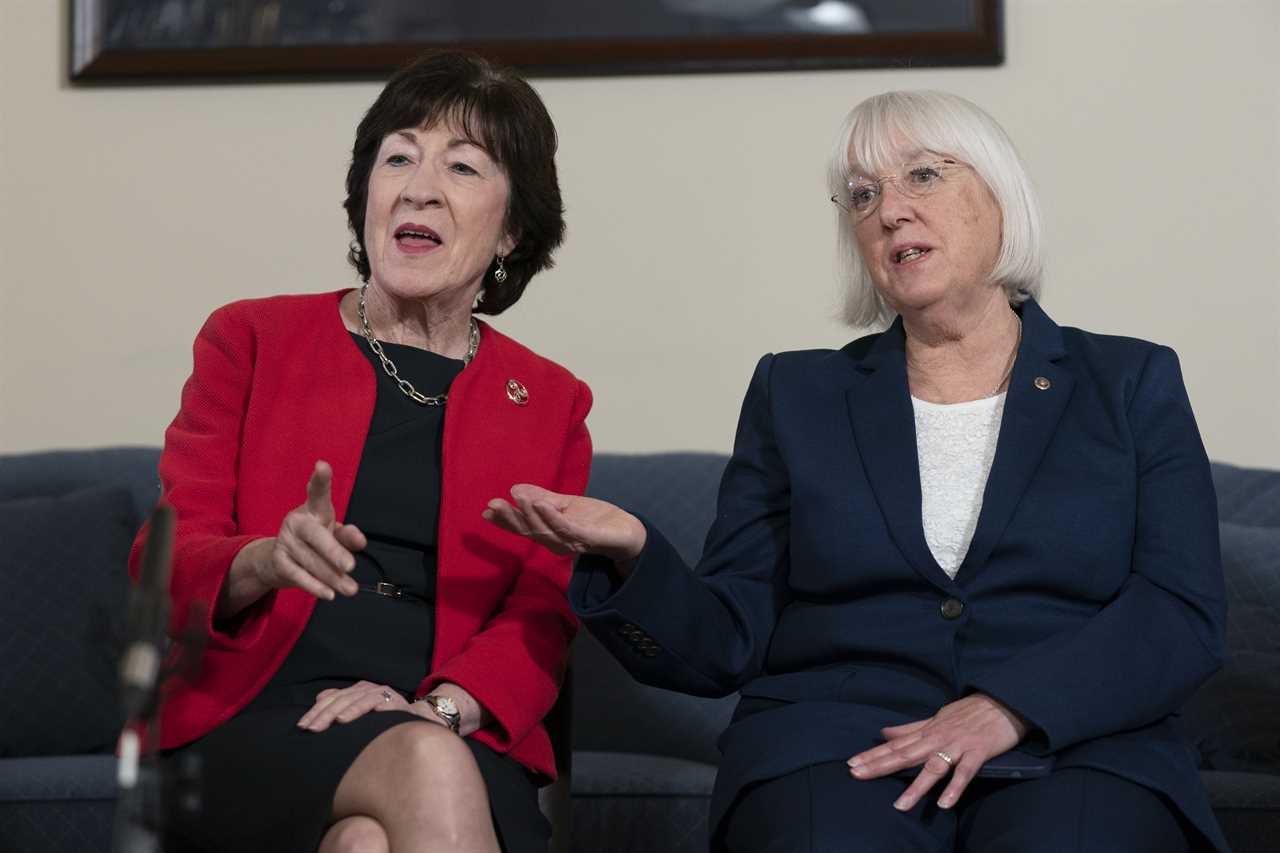
Two senior senators are hard at work on a possible funding escape hatch from Congress' debt-limit nightmare.
Senate Appropriations Chair Patty Murray (D-Wash.) and her Republican counterpart, Maine Sen. Susan Collins, are working to nail down government funding totals for the fiscal year that starts in October. If they succeed in the next few weeks, they’d achieve a bipartisan feat unseen in years — allowing the upper chamber to move forward with a dozen annual spending bills.
They have a big problem, though: This year’s spending climate in Congress is light years away from normal. House Republicans have conditioned a must-pass bill to lift the debt ceiling — which may need to happen as early as June — with their demands for steep federal spending cuts.
So far, Democrats have refused to play ball, leaving talks on both the debt limit and government funding at a stalemate. But that hasn't stopped Murray and Collins from hoping, perhaps too optimistically, that their discussions might provide the bipartisan framework necessary to haul the country out of two potential financial crises — preventing both a debt default in June and a government shutdown at the end of September.
Their colleagues aren't writing them off yet, hoping the effort will inject new life into the onerous task of writing spending bills. But few senators are confident: “I’m not concerned about the debt limit derailing the process,” Arkansas Sen. John Boozman said, adding that he actually sees a core agreement on topline spending numbers as “probably the hardest thing to get done.”
Boozman, a senior Republican appropriator, lauded Murray and Collins for “talking in earnest” even though both sides still appear “pretty far apart.” And Sen. Jon Tester (D-Mont.), who leads the Appropriations subpanel on defense spending with Collins, described the committee leaders’ conversations as “serious.”
The two top appropriators’ talks are a departure from standard Senate practice in recent years. Rather than waste precious floor time, the chamber’s leaders have instead usually opted for directly negotiating with House appropriators in a bid to land bills that can pass both chambers.
And those discussions usually come down to the wire, saddling lawmakers with votes on sprawling legislation that comes out just days or hours beforehand — a process no one has been happy with.
In a brief interview last week, Collins acknowledged her discussions with Murray, but said she’s waiting to see what shakes out in the House. However, she added she's "determined" not to let the debt-limit stalemate derail annual spending bills.
“We have laid out an aggressive schedule to bring the bills to the floor and to do that, we have to have a topline,” the Maine Republican said. “I’m sure we’ll be talking, but first I want to see where the House lands."
Other Senate appropriators aren’t so bullish about the push to finish a slate of spending bills against the backdrop of a debt-limit standoff, with no clear resolution in sight. Asked if he’s worried about the debt battle thwarting those bills, Sen. Chris Coons (D-Del.), who oversees funding for the State Department, said simply: “Yes. I’m concerned.”
A bipartisan agreement between Murray and Collins would further negate the need for Senate Democrats to draft a budget, or a nonbinding measure that lawmakers often skip as part of the federal budget process.
Senate Budget Chair Sheldon Whitehouse (D-R.I.) said Tuesday that a budget isn’t officially off the table, although he’s receiving “zero pressure” from fellow Democrats to write one, given broad satisfaction with President Joe Biden’s fiscal 2024 budget.
House Republicans could set their desired overall government funding level for the coming fiscal year as soon as this week, using a procedural gambit that would both tee up floor action on Speaker Kevin McCarthy’s debt-limit package and automatically establish a $1.47 trillion total spending level once Republicans adopt the rule on the floor.
House Appropriations Chair Kay Granger (R-Texas) said she hasn’t spoken with her Senate counterparts, but that she hopes to mark up GOP spending bills in May and pass them on the floor as early as June. That's likely a rosy timeline, given the debt-ceiling drama, and even then those numbers would most assuredly change in any bicameral talks with the Democratic-led Senate.
“We’re pushing as hard as we can,” Granger said in a recent interview.
House Republican appropriators know their proposed cuts will never become law, and they’re waiting to see whether the Senate actually produces the promised spending bills. A number of House GOP members expect the Pentagon to escape any major slashing — in fact, it may even see a small funding boost — in the bills that the Republican majority write.
Funding for military construction and the Department of Homeland Security could also escape the brunt of McCarthy’s $130 billion in proposed spending cuts, according to senior GOP appropriator Rep. Tom Cole (R-Okla.), resulting in even steeper cuts across other bills that make up the bulk of domestic programs.
“They’re probably the only three guys that are going to be popping champagne corks,” Cole said of his colleagues leading the Defense, Military Construction and Homeland Security spending panels. “The rest of us are going to be crying in our beer.”
----------------------------------------
By: Caitlin Emma
Title: Senators plot bipartisan spending backup plan amid McCarthy-Biden split
Sourced From: www.politico.com/news/2023/04/26/senate-debt-mccarthy-biden-00093777
Published Date: Wed, 26 Apr 2023 03:31:00 EST






